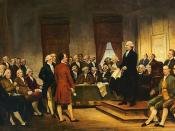Kelly Miller AMH 2010 Professor Alvarez 5-December-2000 The Three-Fifths Compromise çÂÂçÂÂçÂÂçÂÂAmerican historians have become aware of how the institution of slavery and the problems of race created tension while drafting the constitution. In the eighteenth century, "when new constitutional principles and structures emerged in North America, slavery inevitably created friction in politics."� The three-fifths clause in the United States Constitution was one of the issues dealing with slavery that caused this friction. This rule ordained "that five slaves would be counted as the equal of three freemen"�for representation in the House of Representatives and the electoral college, and for direct taxation that the state would pay to the national government. "Some historians have argued that the three-fifths clause...was a product of significant conflict over the issue of slavery in the Convention of 1787"� Other historians place little importance to this clause, arguing that the three-fifths rule was really not a compromise at all.
The purpose of this paper is to analyze each of these arguments, tell exactly how the three-fifths rule was established, and show the repercussions of it on later politics.
çÂÂçÂÂçÂÂçÂÂThe three-fifths rule is often called a compromise between the North and the South. The North wanted to count all the slaves in regards to direct taxes but not towards representation. On the other hand, the South wanted to count the slaves for representation purposes but not for taxation. It was also a way to give the South equality in government in return for the governmental control of interstate and commerce that New England pressed for.4 This interpretation, however, is not evident by the history of the Convention. Firstly, the idea of the three-fifths formula did not originate in the Constitution, which most people are led to believe. The original three to five ratio was established five years...


